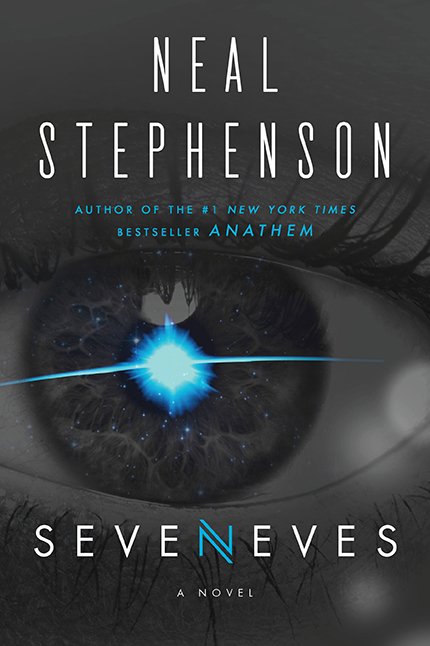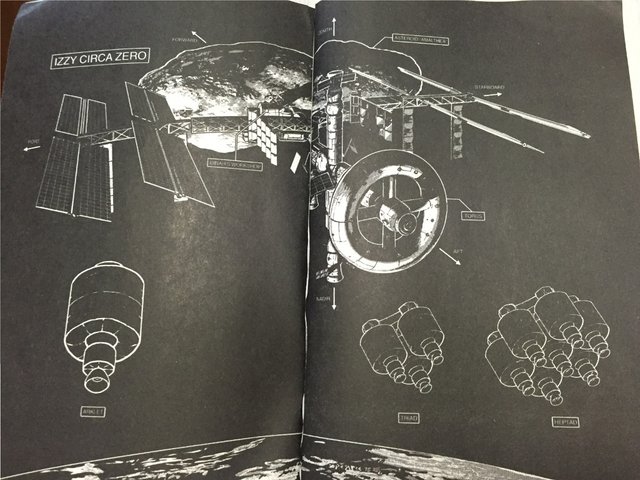Book Review - Seveneves by Neal Stephenson

Seveneves is a post-apocalyptic sci-fi vision of our near and far future. Neal Stephenson has always had a way of taking big ideas and writing about them in a gritty, realistic fashion that's chock full of details but reasonably fast-paced at the same time. He's once again true to form in this thick, epic page turner of a novel.
The basic premise of Seveneves is that a mysterious force, which comes to be called the Agent and is never fully explained, blows up the Moon. Said celestial body splits apart into millions of small fragments that rain down on the Earth, triggering an extinction level event that renders the surface uninhabitable and almost destroys the human race. What makes the story unique and exciting is how humanity saves itself: by building a series of giant habitats in space, and living off-planet for the next several thousand years.
An exploding Moon? What kind of half-assed plot device is that?
I know, I know, it sounds silly when you say it out loud. But the event itself is actually not so important. The meat of the story is how the consequences play out: the decisions made by people on the ground and in space, the science of trying to survive, the series of mishaps that kill off the survivors one by one, and the perseverance of said survivors as they lay the groundwork for the future evolution of the human race. It's all about giving humanity a fresh start in a radically different environment.
The book is split into 2 distinct parts: the first is a classic disaster story chronicling the destruction of the world and what happens to the handful of survivors as they try to establish a self-sustaining home in orbit. Then we fast forward 5000 years, and see in the second part of the book how humanity has evolved & what happens when people make a triumphant return to a much-changed Earth.
My only gripe with this novel is that it tries to do too much. Each of the book's 2 parts are wildly different (the first is like the historical background narrative for the second), and could have been standalone novels in their own right. I won't spoil the ending, but I will say it was abrupt and not particularly satisfying. I was left yearning to know what happens next and wish it could have been fleshed out more as a second novel in a series.
This sounds like an odd format. What if I like the first part of the book but not the second?
You'll like them both. Although the transition from part 1 to part 2 is a little jarring, there is enough linkage between them so you won't lose interest or momentum. And it's fun to see how things in the second half are shaped by distant events from earlier in the book. I kept thinking wow, if that character from before only knew how things end up! We, as readers, are quite privileged to see cause & effect play out over a grand timescale.
As a case in point, I like how the advanced futuristic technology showcased in the novel's second half can be traced to roots in the first half that directly connect to existing technologies today. That makes the science in the book believable, which is a large part of the draw for me. For example, the precursor to the advanced space habitats of the future is none other than the International Space Station itself, affectionately nicknamed Izzy.
Hello Izzy!

Unlike real life, Izzy is attached to a small asteroid captured near Earth that features prominently as a shield to keep the space station safe from random debris floating around orbit. The asteroid also provides a convenient environment for station personnel to perfect space mining technologies with small autonomous robots, which become ubiquitous tools in the far future. Izzy gets expanded dramatically as humanity prepares for the coming mass extinction event, turning into a kind of command & control hub for a whole flock of smaller, independent living modules called Arklets. Arklets can dock with one another to form larger constructs, sort of like building with Legos. I could go on but it's more exciting for you to discover all the technological goodies for yourself.
I suppose I should give fair warning: the author does get frequently side-tracked into detailed explanations of the technology and scientific marvels featured throughout the novel. Some people might find this slows down the narrative pace, but I'm a science nerd so I appreciated the effort to flesh out this information and not simply gloss over it. It's also kept to a basic level palatable to the general public, so don't let it scare you off. However if science is not your thing, you could find these bits tough slogging (but if that's the case you shouldn't be reading a hardcore sci-fi novel in the first place).
I can live with that. What else does the book have in store?
Another great aspect of the story is the constant dramatic tension. Throughout the whole first half of Seveneves, you get a sense that humanity is just barely hanging on by its fingernails. Space is dangerous. Just as in real life, nothing goes perfectly for the occupants of Izzy as a constant series of mishaps, accidents, and flat out disasters make you wonder how the hell anyone at all is going to survive this. It's a great way to keep the story lively, and makes you want to keep flipping pages to find out how the more optimistic promise of the novel's second half is finally realized.
And what an about face that second half is! The human race goes from the verge of extinction to a state of technological advancement we can only dream of today.
Ooooh, shiny.

The blue circle at the center of the above diagram is Earth. Without giving too much away, we see here a map showing the location of major space stations (habitats) in orbit 5000 years after the exodus from humanity's original home. Notice the map's title: "The Habitat Ring circa A+5000". This illustrates yet another great storytelling device: the introduction of a brand new calendar system.
As befitting such a monumental event that alters the course of human history, calendar years are reset following the destruction of the Moon. Zero, or A+0, is the year of the great explosion itself. So A+5000 means 5000 years since Zero. This little detail really adds a nice bit of flavor to the story and reinforces the sheer scope & impact of the events being chronicled. It fits very well with the overall theme of wiping the slate clean and hitting the reset button on the evolution of humanity.
Sounds like a very cool book!
Yes. Yes it is. In short it's another Neal Stephenson masterpiece, filled with hardcore science details but with a fast moving, epic plot that makes it accessible even if you don't know much about space. Anyone who likes explorations into the unknown, conjecture about the future, and grand disaster stories will enjoy this.
My only real regret is that the story ended when it did. I'm left with more questions than answers, and want to know what happens next. It would be great to see a follow-up novel to properly resolve the dangling plot threads!
So what does the title, Seveneves, actually mean?
Now that intriguing point is just something you'll have to find out on your own by reading the book!
Amazon sales page:
https://www.amazon.com/Seveneves-Novel-Neal-Stephenson/dp/0062190377
Author's web site:
http://www.nealstephenson.com/seveneves.html
If you've read Seveneves, feel free to add your own reviews & impressions in the comments below. Recommendations for similar books in the same genre (or stories on Steemit) are also welcome.
Disclaimer: I am not affiliated in any way with Neal Stephenson and am not promoting this book in any official capacity. This is my own personal review after reading and enjoying this great novel. I am simply sharing my opinion for the benefit of any fellow sci-fi junkies who may be looking for something new to read.
Image credits: the book cover title image is taken from Neal Stephenson's web site (linked above). The other images are photographs of illustrations within the book, taken on my iPhone (please excuse the poor quality, it's very difficult to take good photos of a book).
but is there anyone delivering pizzas in their space habitats?
Sadly I suspect the art of pizza making was lost in the destruction of old Earth, which is maybe the biggest tragedy of all. :-)
Ooo, cool. A new Neal Stephenson book! Also, congrats on 100+ followers!
Ahhh, you noticed, thanks! ;-) And yeah, can't go wrong with Neal Stephenson, he deserves his home on my book shelf. It's not exactly a new book though, just one I hadn't got around to reading until now.
I am yet to read a lot of his books, but yeah. If I still kept books on shelves, he'd need one along with Teryy Pratchet and Robert Rankin. Although they are quite different in style and thematicly, all three would need personal shelves.
Does this mean you do most of your reading on an e-reader device? I love my Amazon Kindle; it's easier to take on the train and saves me a ton of physical storage space. But I still like to buy the occasional physical book, especially when I go on vacation. There's just something so deeply satisfying about the weight and bulk of it in my hands, and that crisp new book smell... plus Kindle is crap for illustrations.